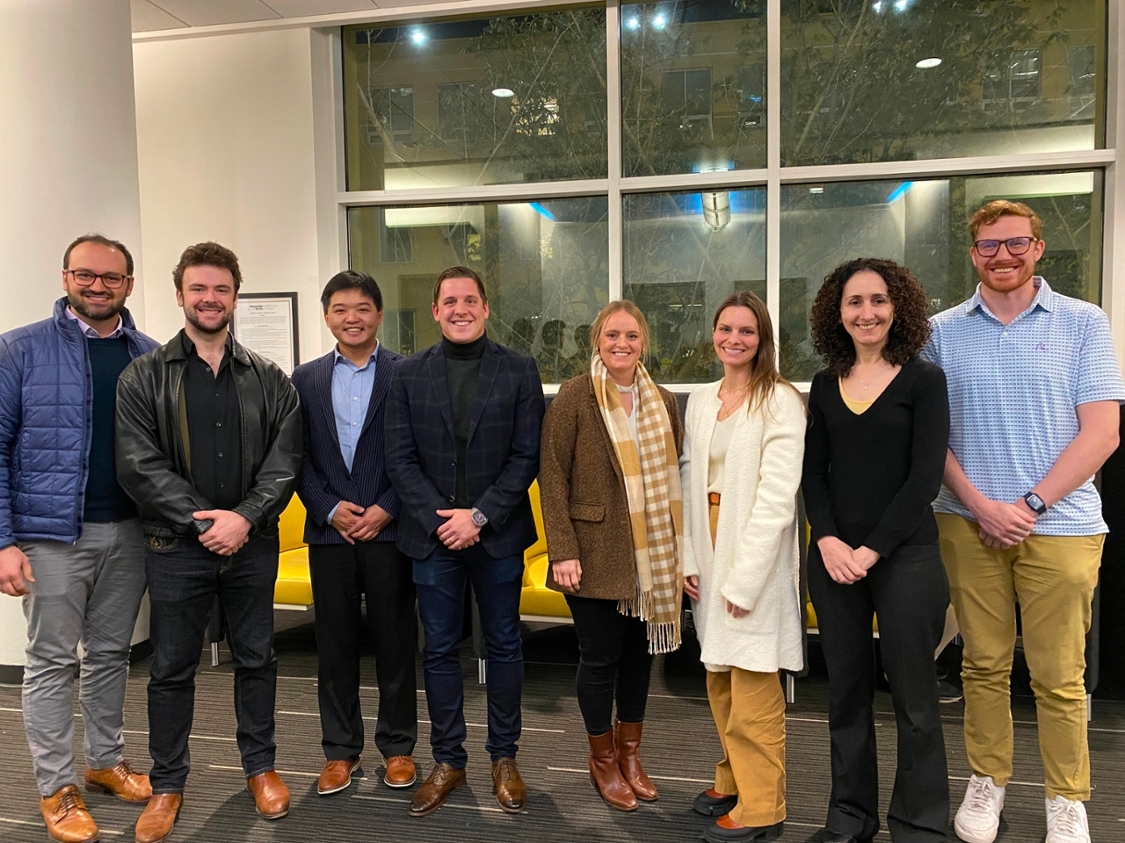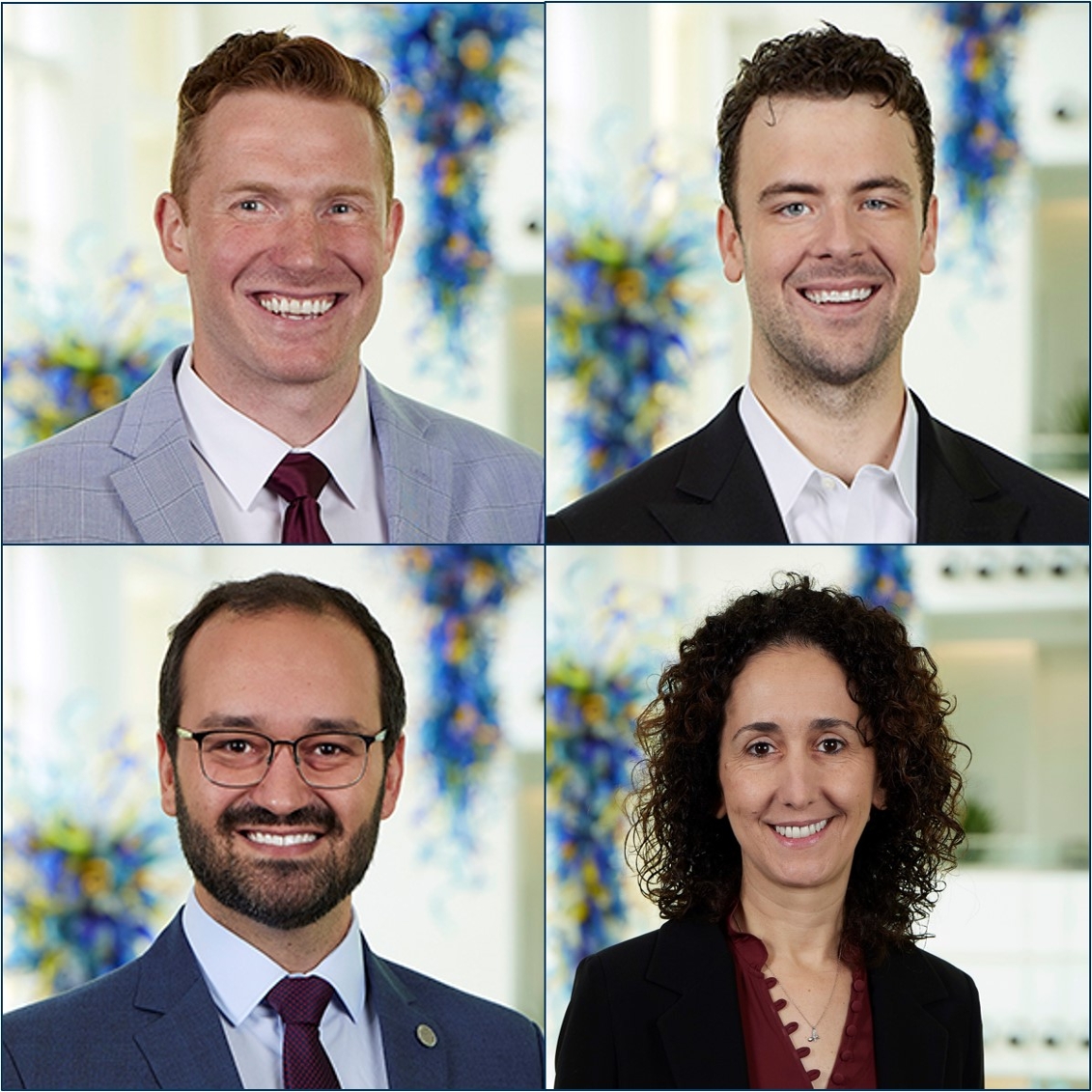After a business analytics practicum, it’s common for students to leverage the real-world experience they gain as a resume builder or talking points during job interviews.
But this year, four full-time MBA students (Jeff Campey, Davis King, Victor Sabioni, and Narin Smith) took their experiences a step further: they became mentors.
All four are graduating this May. Campey, King, and Smith are concentrating in business analytics, while Sabioni is getting a dual degree master’s in aerospace engineering/MBA with a concentration in strategy and innovation. Sabioni and King are mentoring student teams working on the Home Depot challenge, while Campey and Smith are mentoring Sparck Technologies student teams.
King came up with the mentorship program idea during the Graduate Business Analytics Practicum Showcase when it was announced that undergraduate students would tackle a business analytics practicum in the spring.
“Mentoring undergraduates seemed like the perfect opportunity to add leadership experience in my own MBA, while also providing a benefit to the Georgia Tech ecosystem,” explained King. “While our coursework includes a significant amount of lateral, or collaborative, leadership, I saw this as an opportunity to lead and coach vertically—while helping the undergraduates get the most out of their practicum experience.”
When Scheller came back after winter break, Narin Smith made sure King’s idea became a reality. “I knew that there was a lot of great talent in the MBA program with not only technical expertise but also excellent business communication skills that could benefit the undergraduate students. I reached out to them to make my case and they were more than willing to help!”
Professor Jonathan Fan taught the fall graduate business analytics practicum and is currently teaching the undergraduate practicum. He is excited to support the mentorship program.
“Having a mentor available is valuable for undergrads because it gives them a peek into the real business world through the eyes of someone who's been there,” explained Fan. “It's like having a personal guide to support them as they navigate the tricky parts of starting a business challenge/career, which helps both their growth and confidence.”
Mentor Motivations
What inspires extremely busy MBAs to give back? We sat down with them to find out--and get to know them a little better:
Why did you volunteer to be a mentor?
Campey: In undergrad, I remember my senior design projects being extremely difficult and industry-specific. Looking back, I wish I had people with industry experience there to help guide me. When hearing about this opportunity, it sounded like a great way to engage, be connected, and help support students and their projects in a way that prepares them for work after college.
King: Mentoring a business analytics practicum is another opportunity to be exposed to an interesting business problem while also giving something back to the community that has built me up over the past two years.
Sabioni: It’s important to expose undergraduate students to real-world applications of concepts they learn in the classroom. Personally, I only got exposure to the practical side of data analytics during my graduate studies at Georgia Tech. Being a mentor allows me to share the knowledge and insights I wish I had received during my undergraduate years.
Smith: I wanted to give back to the program and share some of the knowledge and experience gained throughout my MBA journey.
What was your working background before going back for your MBA?
Campey: I worked for 10 years at a company that sells enzymes to paper manufacturers in various roles. I started as a field engineer and then moved into roles as a sales engineer, product manager, and technical manager.
King: I have 7 years of professional experience in operations and sales across real estate investments and consumer packaged goods.
Sabioni: For five years, I worked in Brazil for a company called Embraer. They’re the 3rd largest aircraft manufacturer in the world, behind Boeing and Airbus. I performed structural analysis of components in the wing and fuselage of Embraer commercial jets (and you’ve probably flown in one before!!).
Smith: I worked in the energy industry in the areas of forecasting, risk management, and finance. I’m actually currently working part-time for Customer Focused Strategies, a boutique management consulting company, in addition to my full-time MBA studies.
Why are you personally interested in analytics?
Campey: Despite moving into heavier sales roles after college, I always appreciated my previous company’s reliance on data to guide technical decisions. It felt like a way to marry my degrees with practical applications, and that carried over when I decided to return to school for my MBA.
King: In the past, data was extremely difficult to acquire. Currently, companies have an overwhelming amount of data, but storing and parsing the data is difficult. The next step is framing what data is important and how to earn a return on the investment of data collection. This is the exact education that I was seeking and have gained during the past two years at Scheller.
Sabioni: With the world evolving at an unprecedented pace, leaders increasingly rely on data to inform their decisions, particularly in areas where traditional experience may be limited. Embracing business analytics allows me to navigate these dynamic landscapes and contribute to informed decision-making in an era where data-driven insights are paramount.
Smith: I have always been energized by solving business problems using data.
Where will you be working after graduation?
Campey: I will be working for Accenture as a senior strategy consultant.
King: I'm currently freelance consulting for an insuratech startup in Vietnam, but I am open to opportunities in the technology sector (worldwide).
Sabioni: I will be working for Bain and Company.
Smith: I will continue as an executive director for Customer Focused Strategies. I’ll also continue to work alongside my husband in our family company, Albitek Automation, which we started together doing industrial automation.
We ended the session with one last question for each mentor:
Why are you excited to work with Sparck Technologies in particular?
Campey: One thing that resonated with me on Sparck’s side was my background in pulp and paper manufacturing. Most of my work was on fiber development and paper production, and Sparck takes that a step further with conversion. I spent a lot of my career analyzing process data for nuances that helped improve machine efficiency and optimization, and I am hoping I can help my team and provide valuable insights to help them deliver impactful recommendations to Sparck.
Why did you choose Georgia Tech for your MBA?
Smith: I chose Georgia Tech precisely because of its reputation and strong faculty in the area of business analytics. I had high expectations going into it--and the program exceeded those expectations.
Why did you choose to combine a master’s in aerospace engineering with an MBA?
Sabioni: It’s incredible how a degree in engineering complements an MBA, and vice versa. While the MBA equips me with the skills to analyze and draw recommendations from a data set, my engineering background allows me to write code to scrape that data set from the web if it’s not readily available or conduct more sophisticated analysis. The integration extends beyond technical aspects – in collaborative research with my engineering team, I draw upon leadership skills developed in my MBA, such as keeping team members motivated, resolving conflicts, and negotiating ideas to propel our project forward.
What are you doing immediately after graduation?
King: I'm excited to share that I'll be getting married in Vietnam this May and that I get to share that experience with many of the friends I've made over the past two years here at Scheller!
Mentors and executives from Sparck Technologies and Thought Logic Consulting discuss the steps needed to make the mentorship program a success. From L to R: Victor Sabioni, Davis King, Professor Jonathan Fan, Jona Amssoms, (Sparcks Technologies) Kylie Amssoms, (Thought Logic Consulting), Leslie Thomas (Thought Logic Consulting), Narin Smith, and Jeff Campey.
Interested in becoming a Schelle MBA? Explore our Full-time, Evening, and Executive MBA program options to find the right fit for you.
